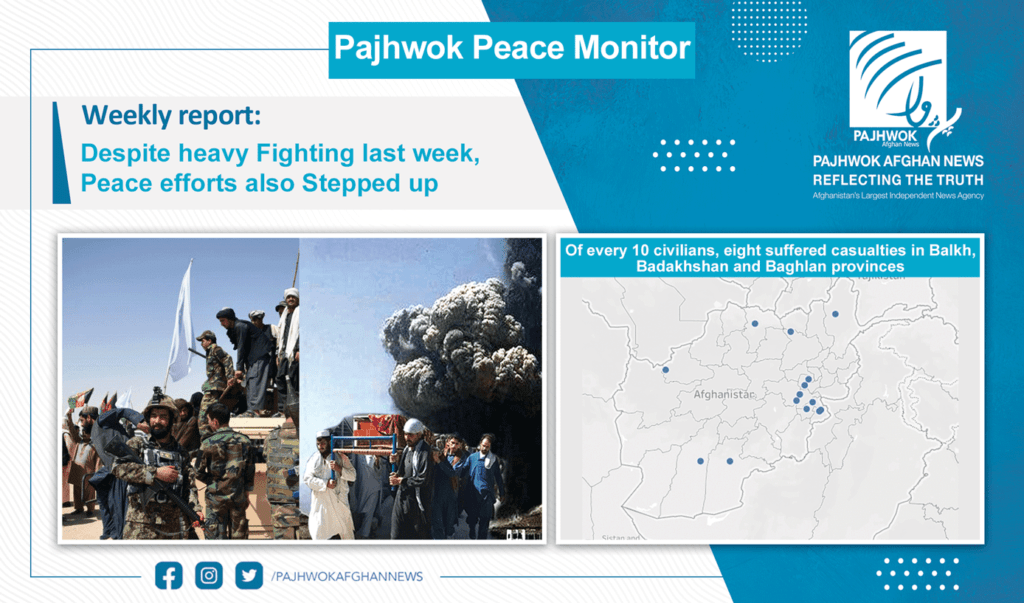KABUL (Pajhwok): Over 150 civilians were killed and injured in Afghanistan last week as peace efforts on national and international levels stepped up.
- Fighting in Afghanistan must stop: Afghan and Pakistani Ulema
- Major breakthrough that will bring happiness to people of Afghanistan will occur this time in intra-Afghan talks: UN
- The Taliban and Afghan negotiating team members meet in Doha almost after one month of break
- Khalilzad discusses accelerating peace talks with government officials in Kabul and negotiating teams in Doha
- Taliban oppose Turkish troops deployment to guard Kabul Airport
- Some politicians criticise internal differences on peace process and distribution of arms which led to worsening of security situation
- Civilian casualties down by six percent last week compared to the previous week
Attacks, civilian casualties:
Forty-one people were killed and 113 others injured — total 154 casualties — in 14 attacks last week in Balkh, Badakhshan, Baghlan, Badghis, Khost, Kabul, Paktia, Logar, Helmand, Kandahar and Maidan Wardak provinces.
Civilian casualties were down last week despite the fact that the Taliban increased their attacks at district levels and fighting intensified nationwide.
In these attacks, security forces and the Taliban also suffered casualties but Pajhwok did not publish the figures because enough information with authentic sources was not available to support casualty figures.
Heavy fighting and Ulema call for peace:
Last week, Afghan and Pakistani Ulema attended a conference in Saudi Arabia and termed violence against innocent civilians an act against the principles of Islam and demanded a halt to the ongoing fighting.
A joint statement demanded Islamic Ummah to play its role in resolving the Afghan problem and a joint ulema commission of Afghanistan and Pakistan should be formed to support ongoing peace efforts.
All these peace efforts come at a time when the Taliban have intensified their fighting at district level and New York Times citing US defence officials reported that US military has got permission over the horizon attacks if the Taliban tried to capture major cities.
Diplomatic peace efforts:
UN has launched efforts to revive intra-Afghan talks and meetings between the Taliban and government delegations took place recently and it is hoped that there would be a breakthrough this time in peace talks.
One day after UN officials expressed optimism regarding peace talks, the Afghan government and the Taliban negotiating teams met in Doha after one month gap and both sides stressed over acceleration of peace talks.
Last week, US Chief Negotiator Zalmay Khalilzad visited Afghanistan and Qatar.
During his stay in Kabul, Khalilzad met President Asharaf Ghani, Chairman High Council for National Reconciliation (HCNR) Abdullah Abdullah, former President Hamid Karzai, and some other Afghan officials.
The visiting delegation assured continuation of political, diplomatic, economic and security support to Afghanistan. They stressed over the development of regional consensus for Afghan peace, withdrawal of foreign forces and the new chapter of relationship between Afghanistan and the US.
Khalilzad then visited Doha, met with negotiating teams and discussed acceleration of peace process.
In another major development India has for the first time opened channels of communication with Afghan Taliban factions and leaders, including Mullah Baradar, Indian media Hindustan Times reported last week.
The move marks a significant shift in New Delhi’s long-term policy of not engaging with the Afghan Taliban in any way and comes at a time when key world powers are veering around to the position that the Taliban will play some part in any future dispensation in Kabul, according to the report.
Taliban oppose Turkish troops stay in Kabul:
Turkish Defence Minister Hulusi Akar said if allies ensured political, financial and logistic support some Turkish troops might be stationed in Kabul Airport to ensure the security of the airport, but the Taliban opposed the offer.
Differences at home and distribution of arms:
Some politicians and heads of political parties in a joint meeting said differences at home caused insecurity and worsening of security situation in the country.
Hizb-e-Islami Head Abdul Hadi Arghandiwal said continuation of differences badly affected the overall situation that no part of the country was peaceful at the moment.
Zabihullah Mujadidi, presidential advisor and head of the Melli-Nijat Party, said some politicians in the government wanted fighting instead of peace and distributed arms among people which were a threatening move for the future of the country. He said evidence were available showing that some politicians distributed arms among illegal groups.
This comes as consultation on the formation of Supreme State Council (SSC) has been ongoing for the past two months, but still there are differences over its structure and authorities.
Religious scholars, Civil Society Organisation (CSO) Peace gatherings:
Some religious scholars and hundreds of youth during separate gatherings in Balkh and Kandahar provinces demanded the conflicting sides enter ceasefire.
In Kandahar City, a large gathering attended by youth and religious scholars on June 05 called for ceasefire and asked the massed raised their voices for the establishment of peace and stability in the country.
In Mazar-i-Sharif, Some Ulema and hundreds of youth during a huge gathering on June 08 called for ceasefire in the country. That gathering held in Hazrat Ali Rawza Mosque expressed their concern over surge in fighting and stressed the need for talks between government and the Taliban. The participants of gathering called on conflicting sides to ensure the protection of educational infrastructure and public property instead of investing on fighting.







GET IN TOUCH
NEWSLETTER
SUGGEST A STORY
PAJHWOK MOBILE APP